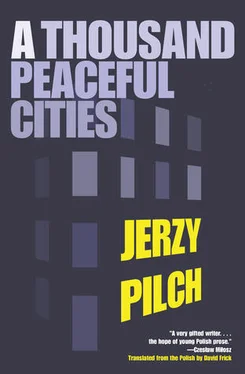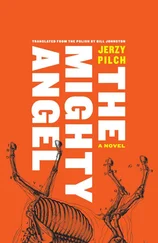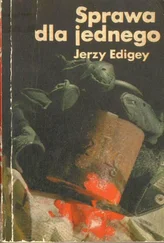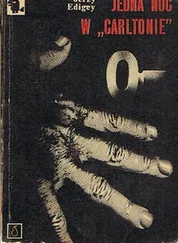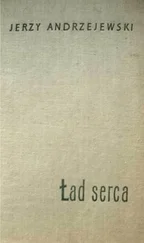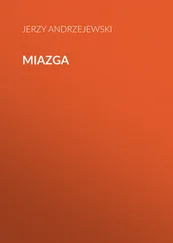“Mrs. Rychter, whatever are you doing? After all, you’re supposed to put snow on the Lord’s tree, and not the other way around — not the Lord’s tree into the snow!” Mr. Trąba called out with the greatest amazement. “It’s a waste of prewar and post-German Christmas tree decorations. It’s even a waste of Bolshevik adornments. .”
But Mrs. Rychter, as if afraid a gigantic worldwide conflagration would start from her Christmas tree, beat the snowy dune frenziedly. The snow glistened. Shreds of ornamental piping and remnants of bulbs flew up into the air, as if in praise of the Lord. Soon it had all gone out, and, still holding the grimy stump in both hands (the remaining mast of the burned sailing-ship), Mrs. Rychter wordlessly disappeared behind the gate to the department store.
“Women.” Mr. Trąba waived his hand with an omniscient gesture.
The dog, huge like a specter, made smaller and smaller circles around us, barked venomously, wheezed with the choked hoarse voice of the predator readying himself to jump. Almost reflexively, I picked up a lump of frozen snow.
“Don’t you even dare, Jerzy,” Mr. Trąba said gently, “don’t you even dare. It’s never right to raise your hand against one of God’s creatures, but especially not on a night like tonight.”
And Mr. Trąba whistled knowingly and amicably patted his knee, and the monster that was coming closer and closer, made furious by our nonchalance, wheezed hatefully and flashed his yellowish fangs, and his entrails, accustomed to digesting human flesh, gave out a piercing whine. He was a bit reminiscent of Bryś the Man-Eater, who belonged to Commandant Jeremiah, but, paralyzed by my fear, I wasn’t entirely certain of it.
“You never know what sort of spirit rattles around in the bowels of beasts.” Mr. Trąba seemed to pay absolutely no attention to Bryś the Man-Eater, or his twin brother from hell, who was cutting off every possible road of return and flight. “Jesus Christ is born, Jerzyk, and although He is born this year for the one thousand nine hundred and sixty-third time, He has come, up to now, only one time, and He will come once more. The first time, Jerzyk. And the second time, Jerzyk. But we don’t know when that second time will be, nor do even the angels know. It is said that the second time He will come in glory and on clouds, but who knows, who knows what the order of things will be? Perhaps He will first appear in invisibility and reticence, and will clothe Himself in glory only after that. The first time He came, He appeared in human form and not even in that of an angel. And yet, after all, Jerzyk, angels are more glorious creatures than are we, but nonetheless merciful God honored us more and lowered Himself more to us than to the angels, when, on that night, He became a man and not an angel. Who knows, Jerzyk, whether at His second coming He won’t lower Himself even further in His infinite humility, who knows whether He won’t come as an even less glorious creature, who knows whether He won’t appear first in the shape of a panther or a she-wolf, and only then, once he casts the beastly covering from Himself, will He judge us in the golden clouds of glory. .”
We were already standing by the house, but the man-eating dog had also drawn nearer — at a distance of one decisive leap.
“Bryś, Bryś,” Mr. Trąba said gently. And the man-eater crouched. His eyes glistened cadaverously. He lurked for yet another second, before the final leap in the direction of our throats.
And then Mr. Trąba raised up his hand, just as Pastor Potraffke sometimes raised his in the pulpit, just as Father would raise his before he said his threefold “I know, I know, I know;” and then Mr. Trąba raised up his hand, just as the Savior raised up His to calm the agitated waves, and with his hand raised, Mr. Trąba said distinctly:
“Brysław, verily I say unto Thee, Brysław: come unto me!”
And as if amused by the incredible buffoonery of this whole scene, the dog suddenly wagged its tail as a sign of peace, jumped on its front paws, now to the one side, now to the other, and at a little trot he approached us and began to fawn at our feet. Mr. Trąba produced a communion wafer from his breast pocket and stuck it into the muzzle that had been miraculously transformed into Good itself. And the dog, delicately taking the Christmas Eve missive between its fangs, began to withdraw. He made greater and greater circles. It looked as if he were running off to share the communion wafer Mr. Trąba had offered him with other creatures, or perhaps to tell them the glad tidings of creation.
We went up the stairs, shook the snow off our shoes. A key turned in the lock. Father opened the door for us.
Jerzy Pilch is one of Poland’s most important contemporary writers and journalists — Czesław Miłosz once called him “the hope of young Polish prose.” In addition to his long-running satirical newspaper column, Pilch has published several novels, and he has been nominated for Poland’s prestigious NIKE Literary Award four times; he won the award in 2001 for The Mighty Angel , also available from Open Letter.
David Frick is a Professor in the Department of Slavic Languages and Literatures at the University of California, Berkeley.
